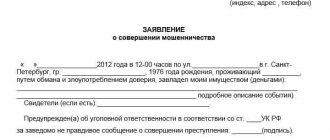Let's take a look in this article. This is not easy, and it is better to seek the help of a lawyer. But if this is not possible, you can write an appeal yourself. But first you should carefully study the rules for drawing up an appeal.
Before writing an appeal, you should decide where it will be sent.
For example, if the decision was made by a court located in the region, then the appeal is sent to the Judicial Chamber of the regional court. And if it was a city court, then the appeal should be written to the Judicial Collegium of the city court.
Despite the fact that the Judicial Collegium of Moscow or the region is indicated as the addressee, the complaint should be sent to the court that made the decision. The trial court will redirect your complaint, attaching a civil case to it.
How to write an appeal?
In the upper right corner is the name of the court and authority, indicating who the complaint is from (full name, address and telephone number), procedural status (plaintiff, defendant, third party). Then you should list the last names, first names, patronymics and addresses of all persons involved in the case.
Below the header in the center of the sheet is the name of the document “Appeal” and the court decision against which it is being filed is indicated.
If you decide to write an appeal, be prepared to analyze the court's decision in detail and indicate where the rules of law were violated. The complaint should also indicate whether the court fully assessed your evidence.
You should definitely file an appeal and count on the cancellation or change of the court decision if:
The circumstances of the case are incorrectly determined; the circumstances established by the court have no evidence; the conclusions of the court of first instance, set out in the court decision, do not correspond to the circumstances of the case; incorrect application or violation by the court of rules of law (substantive or procedural).
There are undeniable grounds for overturning the decision of the court of first instance:
The case was considered by an illegal composition of the court; during the consideration of the case, a person (or several persons) taking part in the case was absent due to failure to notify him; the rules regarding the language in which the court hearing is held were violated; adoption by the court of a decision concerning persons not involved in the case; there is no signature of the judge on the court decision; lack of minutes of the court hearing in the case; violation of the secrecy of the meeting of judges in the decision-making process.
File an appeal
in such cases it will be the right decision. But before you write an appeal, make sure that you are ready to provide references to violations by the court.
The appeal must end with a request. Before writing an appeal, formulate the request correctly in accordance with the powers of the appellate court. For example, “ cancel the decision... and make a new decision on the case, refusing to satisfy the claims...
».
Copies of the complaint according to the number of persons participating in the case, and a receipt for payment of the state fee are placed in the attachment. Documents that need to be attached to the case materials can also be attached here.
The appeal must be certified by your signature and contain the date of preparation. These are the basic rules regarding how to write an appeal.
.
Appeal (sample):
Free samples of claims, complaints, contracts, etc. website
According to statistics, the number of court decisions that are overturned by appellate instances is quite small. Therefore, if the district court made a decision with which you do not agree, first of all, it is necessary to study in detail how to correctly write an appeal to the court. Of course, there must be serious reasons for filing it - an indication of reasons that violate the provisions of procedural law. Let's look at how to correctly write an appeal to the court.
What is an appeal?
An appeal is a procedural form of documentation that allows you to challenge an unlawful court decision that has not entered into legal force. Any participant in the process - the accused, the victim, the prosecutor and other persons participating in the case - has the right to draw up such a complaint. At the same time, other citizens who are not related to the case can also act as appellants, if a judicial act on such authority was adopted earlier.
In procedural law there are 2 types of appeal:
- Full. In this case, the case is reviewed from the very beginning and on its merits.
- Incomplete. This procedure involves checking the court decision of the 1st instance for its validity and legality.
Deadlines for appeal
Court decisions do not take effect immediately after they are issued. The legislation gives time to appeal them - a month from the date of the court decision (Article 321 of the Code of Civil Procedure of the Russian Federation). There is an exception: decisions in cases of administrative violations are contested within a short period of time - 10 days. If the deadlines for an appeal are missed, they can be restored by filing an appeal by the interested party indicating a valid reason for this omission (Article 112 of the Code of Civil Procedure of the Russian Federation). In order to file this petition, it is necessary to meet the deadline within 6 months from the date of the verdict.
Important!
The completed appeals are submitted to the judicial body that made the final decision in the first instance. Then, within 3 days, the appeal along with the case is sent to a higher judicial body, which will examine it.
How to properly file an appeal to the court?
The legislator of the Russian Federation does not establish specific requirements regarding the preparation of an appeal, other than mentioning that it must be submitted in writing. Therefore, its content should be based on the general points of office work and the requirements of Art. 322 Code of Civil Procedure of the Russian Federation. So, how to write an appeal or statement to the court correctly?
To do this you need:
- In the header of the complaint, indicate: the name of the judicial body to which the appeal is being filed;
- information about the court in which the appealed decision was made;
- information about the appellant indicating his place of residence;
- information about all participants in the process;
- information on the decision of the judicial authority (date of adoption of the decision, its number, etc.).
Important!
Such a complaint must not contain syntactical, spelling or other errors. Remember that other parties may file an appeal, so clearly support your arguments.
The appeal submission is signed by the prosecutor.
In addition, a receipt must be attached to the appeal, if necessary. The number of photocopies of the appeal complete with attached documents must be equal to the number of participants in the case. It is noteworthy that the appeal cannot contain claims that were not previously stated to the court when considering the case.
State duty
Appeals against the actions of a judge in criminal cases sent to the appropriate authorities are filed without paying a state fee in the manner prescribed by the Code of Criminal Procedure of the Russian Federation.
Preliminary appeals to courts of general jurisdiction and colleagues of arbitration courts are submitted together with a receipt for payment of the state fee, which is:
- For individuals - 300 rubles.
- For legal entities - 2000 rubles.
When appealing an arbitration decision to the appellate instance, the state fee will be 50% of the amount of the state contribution, which is indicated when filing a non-property claim.
The law provides for a category of persons who are entitled to benefits when paying state fees when filing a challenge in certain types of courts:
- disabled people of categories 1 and 2;
- veterans of military service and combat.
Disabled people of groups 1 and 2 are exempt from paying the state contribution when filing a challenge in the courts of general jurisdiction, magistrates and the Supreme Court of the Russian Federation. The norm is regulated by clause 2 of part 2 of Article 333.36 of the Tax Code of the Russian Federation.
Veterans of military service and combat operations do not pay mandatory state duty if they appeal to the highest authority on issues of protection of their rights, which are outlined in the Law of the Russian Federation “On Veterans”.
In other property and non-property disputes that take place within the framework of administrative cases, the state fee established for filing a challenge is paid in full.
Depending on the type of administrative and civil case, the amount of the fee may vary. Each type of dispute is described in Art. 333.22 of the Tax Code of the Russian Federation and provides for a separate established amount when filing a challenge.
For example, if an appeal is filed by an employee regarding his illegal dismissal and the restoration of his right to work, the state contribution is not charged. A similar short appeal, but filed by the employer, is subject to a fee.
What to expect from the outcome of the appeal?
Having considered the appeal/submission, the court has every right to take the following actions:
- Refuse to satisfy the appeal/representation and leave the decision made by the court without making any changes.
- Cancel the court decision or amend the decision of the court of first instance. Moreover, the introduction of changes can be complete or partial.
- Completely reverse the court decision and terminate the proceedings.
- Do not consider a complaint if it was filed after the end of the appeal period, and the issue of updating this period was not discussed with anyone.
Types of judicial acts and the procedure for appealing them
Article 389.2 of the Code of Criminal Procedure of the Russian Federation identifies three groups of judicial acts that can be appealed to the appellate instance. Each group has some appeal features:
- Final decisions of the court of first instance - a verdict of guilty or acquittal, a decree or a ruling to terminate a criminal case (prosecution).
- Judicial acts (rulings, decisions) issued as part of the trial. During the consideration of a criminal case, the judge (court) can make decisions on various issues. As a general rule, such judicial acts cannot be appealed immediately. If there is a need to challenge them, this can only be done together with an appeal of the court decision based on the results of the process.
- Judicial acts issued as part of a criminal investigation and during a trial, which can be appealed immediately, without waiting for a final decision in the case. Such acts include:
- the decision of the magistrate to return the application or to refuse to accept it;
- decision to select a preventive measure or extend it;
- decision on placement in a medical hospital;
- decision on placement in a medical psychiatric hospital for examination;
- decision on the seizure of property, setting the period of such arrest or its extension;
- decision to suspend the proceedings;
- decision to transfer the case according to jurisdiction or change jurisdiction;
- decision to return the case to the prosecutor;
- private definitions (decrees);
- other judicial acts (procedural decisions) that block further progress in the case.
The nuances of challenging the above judicial acts relate mainly to the emergence of the right to appeal. Otherwise, the procedure for preparing, filing and considering an appeal does not differ significantly.
What would serve as a compelling argument for overturning the verdict?
Any lawyer or notary can tell you how to write an appeal.
A valid reason for overturning a decision in a case is the following:
- Incorrect determination of circumstances that are significant for the case
- The court's conclusions are not true
Definitely, for success in an appeal hearing, it is best to find a highly qualified lawyer who knows his job intimately. Know your rights, this will help you achieve justice, and you can view the appeal form on the Internet. Today there are plenty of forms and samples to fill out on the Internet.
The decision of the court of appeal gains legality and begins to take effect from the day the verdict is rendered.
It can be successful for you if you approach this issue responsibly and are able to express weighty arguments. Do not lose heart and do not get lost, because in this way you give the court the opportunity to doubt your innocence.
Of course, it is very difficult to prove it yourself, and not every lawyer can be counted on. Therefore, you can spend a lot of time searching for a highly qualified lawyer. But you can definitely trust the protection of your interests only to a reliable specialist.
Description of the procedure for drawing up an appeal against the decision of the tax authority on an on-site or desk audit:
An appeal is a special form of appeal to the court of appeal, which is a higher authority reviewing the courts of first instance.
Filing an appeal is usually a complex undertaking. It is important to take into account all the mistakes that the court made when making its decision. It is important to present it correctly. Use samples carefully
Appeal against a decision in civil proceedings
Home » Appeal against a decision in civil proceedings. Sample on how to file an appeal. Filing an appeal to the court. Appeal - SAMPLE
Subsidy for single mothers I am a single mother, one child, I am 27 years old, a farm specialist, I do not have my own home, is there a subsidy for. All news
An appeal is a special form of appeal to the court of appeal, which is a higher authority that reviews the decisions of the courts of first instance.
If for any reason you are not satisfied with the court's decision, you will have to file an appeal.
Who can appeal
In this part, three groups of people can be distinguished:
- The direct participants in the process are the defense and prosecution. A suspect, accused, defendant, convicted, acquitted, a person against whom the case has been dismissed by the court, as well as their representatives (legal representatives, defense attorneys) have the unconditional right to appeal. On the part of the prosecution, the unconditional right to appeal belongs to the victims, their representatives and the prosecutor's office.
- Participants in the process in the status of civil plaintiff and defendant, who do not simultaneously have another status (for example, victim or accused). Such persons are limited in their right to appeal and can file an appeal only insofar as it relates to a civil claim in a criminal case.
- Any other persons whose rights, freedoms and interests are affected by the contested judicial act. These persons have the right to file an appeal only regarding the violation of their rights, freedoms and interests.
The lion's share of complaints falls on the defense side. The victims and the prosecutor's office follow her. Unlike other persons, the prosecutor's office prepares not a complaint, but a presentation. True, the differences are only in the form of address.
How to write an appeal against a decision of a district (city) court
In order to defend their point of view during the court hearing, the parties to the civil process present evidence, request the questioning of witnesses, and the appointment of a forensic examination.
However, citizens often do not agree with the court decision made in a civil case, believe that their evidence was not taken into account when making a decision, or believe that the court incorrectly applied the procedural or substantive rules of the law.
In this case, the party whose interests are infringed by the court decision appeals the decision, proving their case in the court of second instance.
Before changes were made to the Code of Civil Procedure of the Russian Federation, until 2012, courts of first instance were appealed through the cassation procedure, with the exception of decisions of magistrates - they were appealed through the appellate procedure.
The parties and other persons participating in the case have the right to appeal.
Appeal in a criminal case against a sentence
To the Judicial Collegium for Criminal Cases of the Moscow City Court
From the defense lawyer of the convicted person by the Preobrazhensky District Court of Moscow -
Petrov Petr Petrovich - lawyer Sergei Vitalievich Chernov, Moscow, st. 7th Parkovaya, 24, office 413
Appeal against the verdict of the Preobrazhensky District Court of Moscow in a criminal case
On July 10, 2022, the Preobrazhensky District Court of Moscow in a criminal case, in accordance with Chapter 40.1 of the Code of Criminal Procedure of the Russian Federation, issued a guilty verdict under Part 4 of Article 291.1 of the Criminal Code of the Russian Federation in relation to Petrov Petr Petrovich, sentencing him to 4 years and 6 months of imprisonment in a strict colony mode.
The defense considers the sentence passed by the trial court to be severe. Does not correspond to the goals of correction, the principle of humanism and the proportionality of punishment to the committed actions of the defendant.
According to paragraph 4 of Article 15 of the Constitution of the Russian Federation, generally recognized principles and norms of international law and international treaties of the Russian Federation are an integral part of its legal system. If an international treaty of the Russian Federation establishes rules other than those provided for by law, then the rules of the international treaty apply.
The Russian Federation, as the legal successor of the USSR - a signatory, recognizes as valid the “UN Standard Minimum Rules for Non-custodial Measures (Tokyo Rules) of December 14, 1990. Paragraph eight of the rules states that the court, having at its disposal a choice of non-custodial measures, must, in making its decision, take into account the needs of the offender in terms of his return to normal life in society, the interests of the protection of society and the interests of the victim, with which should be consulted in appropriate cases. In other words: the sanction of Article 291.1 of the Criminal Code of the Russian Federation provides for the possibility of applying a fine as an independent type, including in the amount of earnings, for a period of 2 to 3 years. Considering that when mediation in bribery occurs, public order and the normal activities of public authorities suffer, therefore the prosecutor’s office acts on behalf of the state. In clause 8.2. The Rules state that the sentencing authorities may provide for the following sanctions in cases: b) conditional release from liability; d) economic sanctions and monetary penalties, such as one-time fines and daily fines; g) suspended sentence or suspended sentence; n) any combination of the measures listed above.
However, the Court, both in violation of these international principles and Russian legislation to apply similar penalties, did not consider their use, imposing an actual punishment in the form of imprisonment.
During the preliminary investigation, a pre-trial cooperation agreement was concluded with the client, the terms of which were fulfilled. He actively repented of the crime he committed. The defense does not agree with the verdict, finds it unfair due to excessive severity, and, therefore, unfounded, subject to change in terms of mitigating the sentence of the convicted person for the crime committed.
According to paragraph 27 of the Resolution of the Plenum of the Supreme Court of the Russian Federation No. 58 dated 15.22.2015 “On the practice of imposing criminal punishment by the courts of the Russian Federation”, in accordance with the general principles of sentencing (Article 60 of the Criminal Code of the Russian Federation), a more severe type of punishment from among those provided for the crime committed is only imposed in the event that a less severe type of punishment cannot ensure the achievement of the goals of the punishment - as can be seen from the verdict, the court did not motivate for any specific reason in conditions where the sanction of the article provides for punishment both related to deprivation of liberty and not related to deprivation of liberty, by collecting a fine or in the amount of wages or other income of the convicted person for a period of two to three years, the court came to the conclusion that the purpose of the punishment - correction - can be achieved in relation to Petrov P.P. only if he is deprived of his liberty. According to part three of Article 60 of the Criminal Code of the Russian Federation, in each case it is necessary to take into account the impact of the imposed punishment on the correction of the convicted person and on the living conditions of his family. If the sanctions of the criminal law, along with deprivation of liberty, provide for other types of punishment, the court decision to impose imprisonment must be motivated in the sentence.
Despite the mention in the verdict that when imposing the punishment, the court took into account “.. the impact of the imposed punishment on the correction of the convicted person and on the living conditions of his family, as well as data on Petrov’s personality ... takes into account as mitigating active assistance in the detection and investigation of the crime ... and also Petrov’s health condition, the presence of a dependent pensioner father.” However, the court formally approached the issue of sentencing, without actually disclosing in the narrative part of the sentence his state of health, his role in exposing other criminals and other circumstances.
The formality of the court is also confirmed by the fact that, in accordance with Art. 252 of the Code of Criminal Procedure of the Russian Federation, the trial of the case is carried out only in relation to the defendant. In this regard, the verdict should not mention the names of persons whose case is not being considered by the court. Meanwhile, the descriptive and motivational part of the verdict contains an indication of the names of the accomplices, that is, O-n., V-v and G., the case against which was separated into separate proceedings. Thus, by indicating in the verdict the names of accomplices, the court allowed language indicating the guilt of committing a crime of persons against whom the criminal case was not considered. According to the law, if the case against some accused is separated into separate proceedings, the verdict indicates that the crime was committed jointly with other persons, without mentioning their names and with a mandatory indication of the procedural position of this person.
As can be seen from the verdict, the court, having listed and, in fact, indicated exclusively positive characteristics, the state of health and his dependent pensioner mother, did not indicate for what reason (there are no motives) such a severe punishment was imposed on him, for what reason Petrov P.P. a punishment not related to deprivation of liberty cannot be imposed, especially since the sanction of Part 4 of Article 291.1 of the Criminal Code of the Russian Federation provides the court with such an opportunity.
Paragraph 12 of the Resolution of the Plenum of the Supreme Court No. 1 of April 29, 1996 “On the Judicial Sentence” (as amended), explains that the courts should not allow the facts of imposing a punishment on the guilty, which in its amount is clearly unfair both due to lenience and due to severity, since in accordance with the provisions of Article 60 of the Criminal Code of the Russian Federation, when imposing a punishment, the court is obliged to take into account the nature and degree of public danger of the crime committed, the identity of the perpetrator, including circumstances mitigating or aggravating the punishment, as well as the impact of the imposed punishment on the correction of the convicted person and on the conditions the life of his family. According to Article 6 of the Criminal Code of the Russian Federation, punishment and other measures of a criminal legal nature applied to a person who has committed a crime must be fair, that is, correspond to the nature and degree of public danger of the crime, the circumstances of its commission and the identity of the perpetrator.
Article 7 of the Criminal Code of the Russian Federation, which establishes the principle of humanism, states that punishment and other measures of a criminal legal nature applied to a person who has committed a crime cannot be aimed at causing physical suffering or humiliation of human dignity.
It is necessary to take into account that Federal Law of July 3, 2016 N 324-FZ Art. 291.1 of the Criminal Code of the Russian Federation is set out in a new edition. In particular, offering mediation in bribery (Part 4 of Article 291.1 of the Criminal Code of the Russian Federation) is punishable by a fine in the amount of one million five hundred thousand to three million rubles, or in the amount of wages or other income of the convicted person for a period of two to three years. As you can see, the new criminal law is more lenient, therefore, due to the requirements of Part 1 of Art. 10 of the Criminal Code of the Russian Federation has retroactive effect.
Moreover, according to the legal position of the Constitutional Court of the Russian Federation, expressed in Resolution No. 4-P of April 20, 2006, contained in Part 2 of Art. 10 of the Criminal Code of the Russian Federation, the order to mitigate the punishment imposed by a court verdict within the limits provided for by the new criminal law presupposes the use of general principles of sentencing, according to which in such cases the mitigation of punishment will be carried out within the limits determined by the entire set of norms of the Criminal Code of the Russian Federation - both Special, and its General parts. When assigning punishment under a more lenient law, it is also necessary to take into account that the legislator, in the sanctions, redefined the nature of the social danger of the relevant crimes - as less dangerous.
And the court, despite the mention of this article in the text of the verdict (as amended by the Federal Law dated July 3, 2016 No. 324-FZ “On Amendments to the Criminal Code of the Russian Federation and the Criminal Procedure Code of the Russian Federation), did not consider the part of the article provided for by the sanction as the main punishment possibility of recovery from Petrov P.P. a fine in the amount of one million five hundred thousand to three million rubles, or in the amount of wages or other income of the convicted person for a period of two to three years. At the same time, the court was presented with Certificate 2-NDFL from the Federal Tax Service for the last three years of his professional activity. Thus, the verdict was passed against Petrov. is illegal and subject to cancellation.
According to paragraph 16 of the Resolution of the Plenum of the Supreme Court of the Russian Federation No. 26 of November 27, 2012 “On the application of the norms of the Criminal Procedure Code of the Russian Federation governing proceedings in the court of appeal,” the court has the right to change the sentence or cancel the sentence and make a new judgment, if this does not the situation of the convicted person in relation to the charges brought by the preliminary investigation authorities worsens, and his right to defense is not violated.
According to Article 43 of the Criminal Code of the Russian Federation, punishment is a measure of state coercion, imposed by a court verdict.
Punishment is applied to a person found guilty of committing a crime and consists of the deprivation or restriction of the rights and freedoms of this person as provided for in this Code, while the punishment is applied in order to restore social justice, as well as to correct the convicted person and prevent the commission of new crimes.
According to Article 56 of the Criminal Code of the Russian Federation, deprivation of liberty consists of isolating a convicted person from society by sending him to a penal colony, placing him in an educational colony, a medical correctional institution, a correctional colony of general, strict or special regime, or in prison and is the most severe type of punishment.
As noted above, the defense finds the verdict passed by the Preobrazhensky District Court of Moscow against P.P. Petrov. unreasonable and unfair in terms of the punishment imposed on the convicted person, subject to change.
Article 61 of the Criminal Code of the Russian Federation establishes circumstances that, in the opinion of the defense, mitigate the guilt of P.P. Petrov, the list of circumstances given in this article is not exhaustive, and the court is given the right to take into account other circumstances not specified in this article, however When deciding the sentence, the court did not indicate mitigating circumstances, although confirmation of their presence is available in the case; in its verdict, the court limited itself to a formal indication of the presence of positive characteristics and personal information, but no more.
According to paragraph 4 of the Resolution of the Plenum of the Supreme Court of the Russian Federation “On the practice of imposing punishment by the courts of the Russian Federation” No. 58, when imposing a fine as the main punishment on a convicted person held in custody, the court has the right, taking into account the period of detention, either completely release such a person from serving this sentence, or soften it (Part 5 of Article 72 of the Criminal Code of the Russian Federation). In case of mitigation of punishment, the amount of the fine may be lower than the minimum limit established by the sanction of the corresponding article of the Special Part of the Criminal Code of the Russian Federation, but not lower than the minimum limit established by part 2 of Article 46 of the Criminal Code of the Russian Federation for a specific method of calculating the fine.
On the basis of the above,
ASK:
1. The verdict of the Preobrazhensky District Court dated July 10, 2017 is amended; 2. Assign P.P. Petrova. a punishment not related to the deprivation of his freedom, not related to serving the sentence in a maximum security colony, since there is no need to isolate the convicted person from Society, and the punishment imposed on him will not contribute to the correction of the convicted person or mitigate the sentence; 3. Consideration of the case in the appellate court should be carried out with the participation of the convicted person;
Attachment: Copy of the appeal.
Lawyer S.V. Chernov
July 15, 2022
How to appeal a court decision
It happens that the judge made a decision that did not sufficiently satisfy our claims, or this decision was not at all in our favor. One way or another, we do not agree with the decision made and want it to be changed or canceled and a different decision on the case made. To do this, we need to appeal this court decision to a higher court before the court decision enters into legal force. If you don't know when a court decision comes into force, find out in this article.
What does it mean to appeal a court decision? This means filing an appeal to a higher (appeal) court against a court decision with which you do not agree.
A “court of appeal” or “court of appeal” is a court of second instance.











